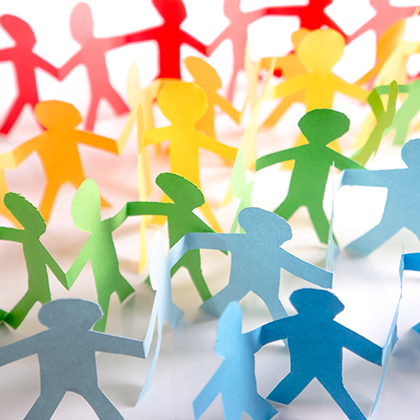
It’s clear that Americans from opposite political ideologies don’t understand each other. But new research and our own polling seem to show that our views may actually be closer together than we think.
Writing in The Atlantic, Victoria Parker, a doctoral candidate at Wilfrid Laurier University, cites a report that she and co-researchers have published for peer review, which indicates both liberals and conservatives believe members of the other side are far more extreme in their beliefs than they really are.
For example, she says, only 28% of liberals surveyed favored abolishing the police, though conservatives in the study estimated that 61% of liberals want to do so. Meanwhile, only 22% of conservatives expressed unwelcoming attitudes toward immigrants, although liberals thought that the number would be 57%.
Such perceptions naturally translate to the workplace. Some researchers have found that employees who feel they don’t fit in with the politics of their co-workers are more likely to leave that job than they otherwise would be. However, according to researchers Dawn Chow and Jeffrey Lees, writing in Harvard Business Review, when people on opposite sides of the divide were told that they overestimated how much people with opposite political groups disliked them, their own mistrust and dislike of those colleagues diminished.
This pattern even seems to extend to our political parties at the Statehouse. When Werth and our polling partner Gongwer recently asked Ohio lawmakers about two hot-button issues — criminal justice and energy policy — we were surprised at how closely they responded on matters such as eliminating the death penalty, the appropriateness of drug sentences, halting oil purchases from Russia and achieving energy independence through a mix of domestic energy sources. Republicans and Democrats did not respond alike on every question, but in a surprising number of cases their differences were only a matter of degree.
This tells us that complex issues cannot always be reduced to a political ideology, though some will try. It also tells us that, despite extreme voices on the left and right, most of us are more in tune with each other’s viewpoints than we think.
This should reassure business leaders, who in today’s charged environment must always be sensitive to the political sensibilities of customers, policymakers, partners and employees. In our work, we’ve found that frequently engaging our stakeholders about their perceptions, goals, barriers to success, and solutions to common challenges reduces our tendency to pigeonhole others according to false assumptions. And it allows us to take some of the energy away from perceived divisions and shift it to partnerships based on respect and shared objectives.
While we may be closer together in our views than we think, it’s important to remember that differences also can be a good thing. After all, diverse life experiences, cultural upbringing and social viewpoints can lead to innovation. Our ability to embrace those differences makes it possible to learn and implement new ideas — the secret sauce, in fact, of strong democracies and successful organizations.
